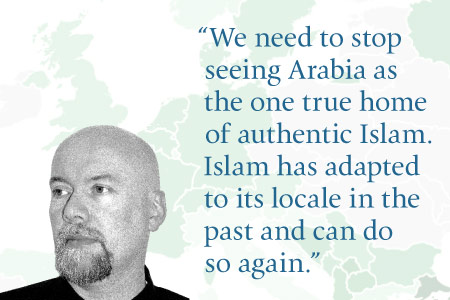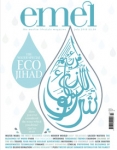
A New Song for Europe?
Issue 70 July 2010
Once again the place of Islam in Europe has been headline news. BBC 3 televised its hard-hitting documentary on the English Defence League. Zakir Naik’s UK visit aroused consternation, prompting headlines such as, ‘Muslim preacher of hate is let into Britain’. And Tariq Ramadan’s lecture at the Oxford Programme on Islamic Reform attracted its usual media attention. The spectrum of ‘the Muslim voice’ now ranges from those who advocate a return to an Islam that is both intellectually and culturally locked in the seventh century, to those who seek a dramatic modernising reformation. But despite this range, most public Muslim voices are seen as ‘other’; certainly not as European, prompting critics to call for Muslims to more fully assimilate.
So, where do we go from here? The American philosopher and humanist George Santayana famously stated: “Those who do not learn from history are doomed to repeat it” and here I think we should look back at both the history of Islam and Europe. The oft-cited pinnacle of Islamic-led pluralism was the medieval society of Andalusia where scientists and thinkers such as Ibn Hazm and Ibn Rushd flourished. They prospered because rulers were flexible and tolerant, and through the development of science, religion and interfaith relations they created a more just and civilised society that historians now refer to as a ‘golden age’. When the leadership was usurped by harsh literalists, in the form of the puritan Almohads, the rising assaults from the Christian West were augmented by internal friction and the Caliphate collapsed.
So the success story of Andalucia was not the triumph of Islamic fundamentalism but the success of tolerance and an ability and willingness to adapt to a new local culture and a new age.
Christianity currently dominates much of the world and I would attribute this partly to the Church’s ability to make people all over the world feel that Christianity is their culture, if not their faith, not something alien and strange born in the middle east. Yet it is every bit as Middle Eastern as Islam. Similarly, the Nazis tried to identify characteristics that would alienate the Jewish community as ‘other’, but most Jews in our society today see themselves and are seen by others as fully European no matter how religiously observant they may be.
The challenge I believe we need to address is how to make Muslims in Europe feel that Islam is or can be as ‘European’ a faith as Christianity. Arabia will always be close to the heart of every Muslim as the location of the Ka’bah and the birthplace of the Prophet Muhammad but we need to stop seeing Arabia as the one true home of authentic Islam. Islam has adapted to its locale in the past and can do so again. Muslims have adopted good local customs and succeeded in establishing new norms for their society in the past, and in both cases it has been done gradually and with a minimum of confrontation.
How we see ourselves has a direct bearing on how others see us. We cannot expect non-Muslims in society to see us as truly European unless we feel European and the language of our dialogue changes.
I sincerely hope that in my lifetime I will witness the development of a truly European Muslim community that is as comfortable with its European identity as it is with its Islamic identity. Perhaps then the modest dress codes we champion can gain the same acceptance that Christian Priest’s robes and nuns’ habits have already achieved and maybe even mosques with minarets can be seen in the same light as churches with their spires. For all the ills we see around us we should remember that the society of the Prophet was much more extreme, yet within his lifetime it came to identify more closely with Islam than it had ever identified with its tribes or culture. Thus if we can learn from his methodology there is nothing to stop us gaining acceptance of Islam as a faith as European as any other.
Dawud Bone is the Stone Ashdown Director of the Centre for the Study of Muslim-Jewish Relations at the Woolf Institute of Abrahamic Faiths in Cambridge.
To check out more of Dawud Bone's articles, click here
Bookmark this |
|
Add to DIGG |
|
Add to del.icio.us |
|
Stumble this |
|
Share on Facebook |
|
Share this |
|
Send to a Friend |
|
Link to this |
|
Printer Friendly |
|
Print in plain text |
|


Comments
2 Comments
1
Ifti
17 Aug 10, 17:04
The British Government is planning to make it easier to schools to “opt out” from the Local Authorities. Muslim children in state schools feel isolated and confused about who they are. This can cause dissatisfaction and lead them into criminality, and the lack of a true understanding of Islam can ultimately make them more susceptible to the teachings of fundamentalists like Christians during the middle ages and Jews in recent times in Palestine. Fundamentalism is nothing to do with Islam and Muslim; you are either a Muslim or a non-Muslim.
There are hundreds of state primary and secondary schools where Muslim pupils are in majority. In my opinion all such schools may be opted out to become Muslim Academies. This mean the Muslim children will get a decent education. Muslim schools turned out balanced citizens, more tolerant of others and less likely to succumb to criminality or extremism. Muslim schools give young people confidence in who they are?
2
neoriental
12 Jul 10, 14:09
Islam has adapted to its locale like India without compromising Sharee'ah as comprehended through the microscope of Fiqh which literally singifies Understanding and techically refers in Islamic theology, or more precisely the Islamic praxis, Understanding God's Law as it applies to the current moment of a believer's sojourn of life here on earth. Ibn Rushd was a great Faqeeh and his treatise Bidaayatul Mujtahid-The Beginning of a Jurist who applies Reason is a great work on the principles of Fiqh.
An important Fiqh principle is that activism for the rule of God's Law is a religious obligation of a Muslim.Also, Fiqh treats living in Daarul Kufr (Abode of Unbelief) as antithetical to Muslim belief.
Hence, the rationalist-literalist is a false dichotomy as applied to the context of Islamic history. Nowhere in the world history we find puritanism a distinctive characteristic of the rationalists like Ibn Rushd themselves than in the spiritual-intellectual tradition of Islamic civilisatio